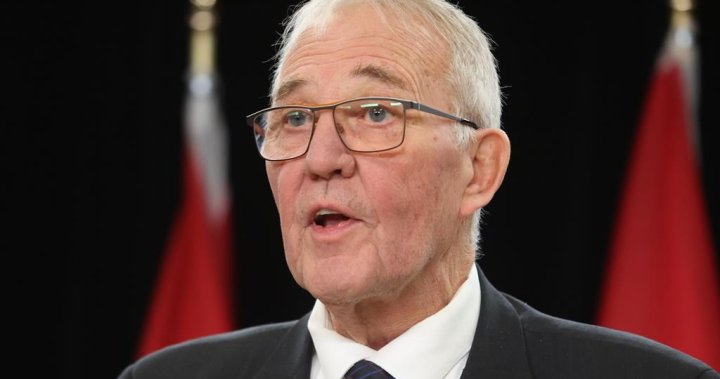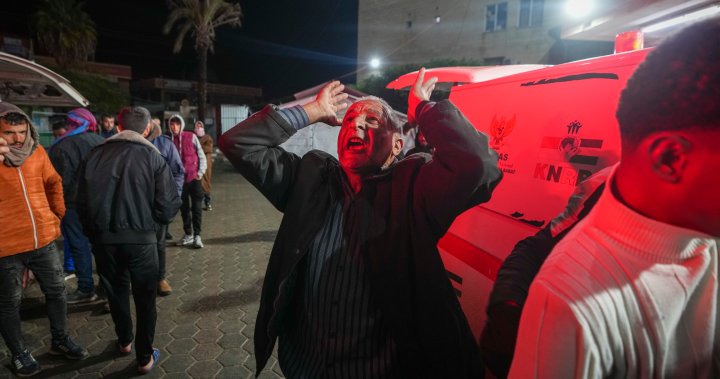Israeli raids killed at least 12 Palestinians in the Gaza Strip, most of them women and children, officials said Wednesday, as the nearly 15-month-old conflict entered the new year.
One of the raids hit a house in the Jabalia area in the northern Gaza Strip, which is the most isolated and most destructive part of the Strip, where Israel has been waging a large-scale operation since early October. The Hamas-led Health Ministry in Gaza said seven people were killed, including a woman and four children, and at least ten other people were injured.
Another attack during the night on the Bureij refugee camp in central Gaza led to the death of a woman and a child, according to Al-Aqsa Martyrs Hospital, which received the bodies.
“Are you celebrating? Enjoy while we die. We’ve been dying for a year and a half,” said a man carrying the body of a child in the flashing lights of emergency vehicles.
Story continues below ad
The Israeli army said that activists fired rockets at Israel from the Bureij area during the night, and that its forces responded with a strike targeting an activist. The army also issued evacuation orders for the area.
A third strike in the southern city of Khan Yunis resulted in the deaths of three people, according to Nasser Hospital and the European Hospital, which received the bodies.
The war began when Hamas-led militants attacked southern Israel on October 7, 2023, killing about 1,200 people and kidnapping about 250. About 100 hostages remain held in Gaza, and at least a third of them are believed to be dead.

“Just to live”: Displaced people from Gaza wonder what awaits them in the new year
The Israeli air and ground offensive killed more than 45,000 Palestinians, according to the Hamas-led Health Ministry in Gaza. It says that women and children constitute more than half of the dead, but it did not mention the number of militants among the dead.
Story continues below ad
The Israeli army says it only targets militants and holds Hamas responsible for the killing of civilians because its fighters operate in densely populated residential areas. The army says it killed 17,000 militants without providing evidence.

Get daily national news
Get the day’s top political, economic and current affairs news, headlines, delivered to your inbox once a day.
The conflict has caused widespread devastation and displaced about 90% of Gaza’s population of 2.3 million, many of whom have been displaced multiple times.
Hundreds of thousands are living in tents on the coast, where winter brings frequent rainstorms and temperatures drop to below 10 degrees Celsius (50 Fahrenheit) at night. At least six infants and one other person died of hypothermia, according to the Ministry of Health.
Many displaced Palestinians in central Gaza rely on charity kitchens as their only food provider amid restrictions on aid and skyrocketing prices. AP footage showed a long line of children waiting for rice, the only item served in the kitchen in Deir al-Balah on Wednesday.
Umm Adham Shaheen, a displaced person from Gaza City, said: “Some of these kitchens close due to not receiving aid, and others distribute small amounts of food that are not sufficient.”
American and Arab mediators spent nearly a year trying to broker a ceasefire and the release of the hostages, but these efforts repeatedly faltered. Hamas demanded a permanent truce, while Israeli Prime Minister Benjamin Netanyahu pledged to continue fighting until “complete victory” was achieved.
Trending now
-

We remember the celebrities we lost in 2024
-

Tax changes are coming in 2025. Here’s what Canadians need to know
Israel is witnessing a net departure of citizens for the second year
Story continues below ad
The Israeli Central Bureau of Statistics said that more than 82,000 Israelis moved abroad in 2024 and 33,000 people immigrated to the country. Another 23,000 Israelis returned after long periods abroad.
This was the second year in a row of net Jewish departure, a rarity in the history of a country that actively encourages Jewish immigration. Many Israelis, looking for a respite from the war, have moved abroad, leading to concern about whether the war will lead to a “brain drain” in sectors such as medicine and technology.
Last year, the number of immigrants to Israel was 15,000 fewer than in 2023.
Army blames ‘weak discipline’ for archaeologist’s death
In a separate development, the Israeli military blamed “operational exhaustion” and “poor discipline and safety” for the November killing of a 70-year-old archaeologist in southern Lebanon along with a soldier while visiting a combat zone.
According to Israeli media reports, Zeev Erlich was not on active duty but was wearing a military uniform and carrying a weapon. The army said he was a reservist and described him as a “fallen soldier” when it announced his death.
Story continues below ad
Ehrlich was a well-known West Bank settler and scholar of Jewish history. Media reports stated that he entered Lebanon to explore an archaeological site.
The army began an investigation after the two were killed in an ambush by Hezbollah. A separate investigation is looking into who allowed Erlich to enter. The family of the soldier who was killed with him expressed their anger at the circumstances.
The army said that the entry of civilians other than military contractors or journalists into combat zones is not widespread. However, there have been multiple reports of Israeli civilians who support a permanent Israeli presence in Gaza or Lebanon entering those areas.
& Edition 2025 The Canadian Press

















